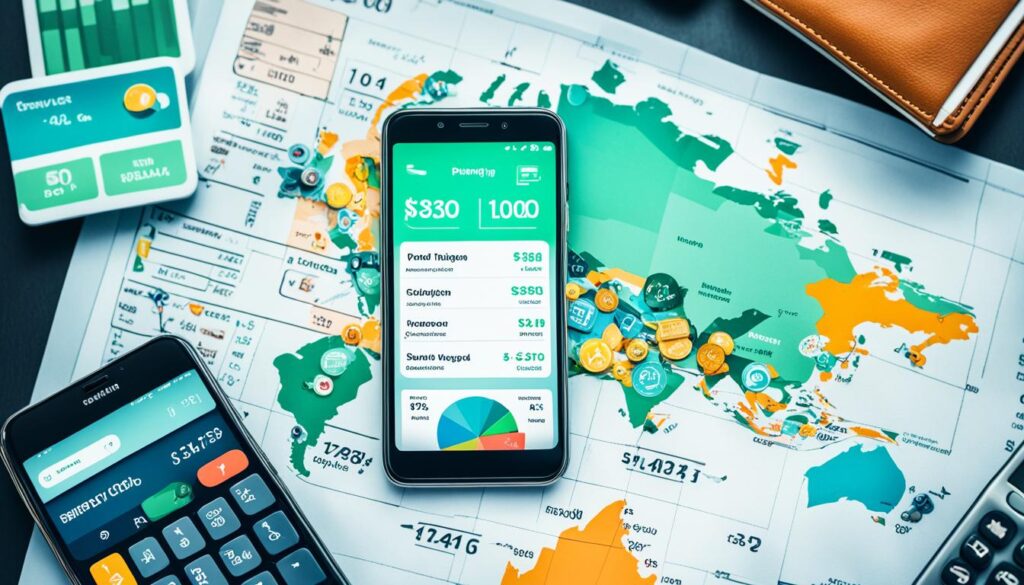Are you dreaming of a memorable vacation but worried about the costs? Don’t let budget constraints hold you back from exploring the world. By mastering the art of balancing travel expenses, you can enjoy amazing trips without breaking the bank. In this article, we’ll share practical budget-friendly travel tips and cost-effective strategies to help you make the most of your travel budget.
Financial planning for travel is key to ensuring you have a clear roadmap for managing your expenses. By implementing smart spending techniques and making frugal choices, you can save money on your trips without compromising on the experiences you love.
Key Takeaways:
- Plan your travel budget and allocate funds to different aspects of your trip.
- Start planning early to take advantage of discounted hotel rooms and cheaper flights.
- Utilize travel budget apps to track your expenses and stay within your budget.
- Maximize reward points by using travel credit cards and redeeming them for flights and hotels.
- Consider traveling during the off-season to enjoy lower prices and discounts.
Importance of Budgeting for Travel Expenses

Proper budgeting for travel expenses is crucial to ensure that you have enough funds to cover all aspects of your trip. Without an effective budget, it’s easy to overspend and end up with financial stress. By managing your travel budget and implementing financial planning strategies, you can have a clear understanding of your available resources and make informed decisions on how to allocate your funds during your trip.
When it comes to budgeting for travel expenses, the key is to plan ahead. Start by setting a realistic budget that takes into account all the costs associated with your trip, including transportation, accommodation, meals, activities, and any unforeseen expenses. Be sure to include a contingency fund for emergencies or unexpected expenses.
One effective budgeting strategy is to break down your travel expenses into categories and allocate a specific amount of money to each category. This helps you prioritize your spending and ensures that you have enough funds for the essentials while still allowing for some flexibility. For example, you could allocate a certain percentage of your budget to accommodation, transportation, and meals, and then have some discretionary funds for activities or souvenirs.
Another important aspect of budgeting for travel expenses is to research and compare prices. Look for deals and discounts on flights, hotels, and activities. Consider traveling during the off-peak season when prices tend to be lower. Use travel websites and apps to compare prices and find the best deals.
“A budget is telling your money where to go instead of wondering where it went.” – Dave Ramsey
It’s also important to track your expenses during your trip to ensure that you are staying within your budget. Use a travel budget management app or simply keep a record of your expenses in a notebook or spreadsheet. This will help you stay accountable and make any necessary adjustments to your spending as you go.
Remember, budgeting for travel expenses is not about restricting yourself or missing out on experiences. It’s about being mindful of your finances and making smart decisions to get the most value out of your travel experiences.
Key Takeaways:
- Proper budgeting for travel expenses is crucial to avoid overspending and financial stress.
- Set a realistic budget that includes all the costs associated with your trip.
- Break down your expenses into categories and allocate funds accordingly.
- Research and compare prices to find the best deals on flights, hotels, and activities.
- Track your expenses during your trip to ensure that you are staying within your budget.
Planning Early to Save Money

When it comes to travel, early planning can play a crucial role in saving money. By starting your trip planning well in advance, you can take advantage of discounted hotel rooms and cheaper flights, ultimately maximizing your travel budget. By keeping an eye on rates and booking at the right time, you can secure the best deals and avoid last-minute price hikes.
One of the key benefits of planning early is the availability of discounted hotel rooms. Many hotels offer special rates for early bookings, allowing you to enjoy the same quality accommodations at a fraction of the cost. These discounted rooms often come with limited availability, so it’s essential to start your planning process as soon as possible to secure the best deals.
A similar concept applies to flights. Airlines often release their cheapest fares well in advance, rewarding those who plan ahead. By booking your flights early, you can take advantage of these lower prices and avoid the surge in costs as the travel date approaches. Plus, having your flights booked early gives you peace of mind and allows you to focus on other aspects of your trip.
Using Planning Tools for Travel
Planning tools for travel are essential resources that can help you find the most cost-effective options for accommodations, transportation, and activities. These tools allow you to compare prices, read reviews, and make informed decisions. They provide valuable insights into the best times to book and can even suggest alternative destinations or routes to save money.
An excellent example of a planning tool for travel is TripAdvisor. With its comprehensive database of hotels, flights, and activities, TripAdvisor allows you to search and compare numerous options to find the best deals. You can read reviews from fellow travelers, view photos, and even book directly through the platform.
Another popular planning tool is Kayak. Kayak’s user-friendly interface allows you to search for flights, hotels, and car rentals, all in one place. Their flexible search options ensure that you find the most affordable options for your desired travel dates. You can set price alerts and receive notifications when prices drop, ensuring that you never miss out on a great deal.
By planning your trip early and utilizing the right planning tools, you can significantly reduce your travel expenses and stretch your budget further. Take advantage of discounted hotel rooms, book cheaper flights, and use the power of technology to find the best deals. Start your planning process today and embark on a budget-friendly adventure!
Using Travel Budget Apps

Travel budget apps are essential tools to help you manage your expenses and stay on track with your travel budget. These apps offer a range of features, including expense tracking, receipt scanning, and budget planning tools, that can simplify the process of managing your finances while you’re on the go.
With travel budget apps, you can easily keep track of your daily expenses, monitor your spending categories, and analyze your overall budget. These apps provide a convenient way to stay organized and ensure that you’re not overspending during your trip.
One of the key advantages of using travel budget apps is their ability to help you split expenses and coordinate costs with your travel companions. These apps allow you to divide shared expenses evenly, eliminating the hassle of manually calculating and dividing costs. You can easily input shared expenses, allocate them to different group members, and keep a record of who owes what.
Popular travel budget apps include Expensify, PocketGuard, SAP Concur, Splitwise, and The BACH. These apps offer user-friendly interfaces, intuitive expense tracking features, and seamless synchronization across multiple devices. Whether you’re traveling solo or with a group, these apps can be valuable companions to help you stay within your budget.
By utilizing travel budget apps, you can have full control over your expenses, make informed financial decisions, and ensure that you’re making the most of your travel budget.
With apps like these, you don’t have to worry about keeping spreadsheets or notebooks to track your expenses. You can easily log your spending, scan receipts, and access your budget information all in one place. These apps provide a hassle-free way to manage your travel finances, allowing you to focus on enjoying your journey.
Maximizing Reward Points for Travel

When it comes to saving money on your travel expenses, one of the smartest strategies is to take advantage of reward points. By strategically earning and redeeming reward points, you can maximize the value of your travels and enjoy more for less.
Travel credit cards are an excellent tool for accumulating reward points. Many travel credit cards offer generous welcome bonuses and ongoing reward programs that can significantly offset the costs of flights, hotels, and other travel expenses. With every dollar you spend, you can earn points that can be later redeemed for various travel perks.
To make the most of your reward points, it’s important to choose the right travel credit card that aligns with your travel preferences and spending habits. Look for co-branded airline and hotel credit cards that offer additional perks such as free checked bags, priority boarding, airport lounge access, and elite status benefits. These added benefits can enhance your travel experience and provide even more value for your reward points.
When using your travel credit card, consider using it for all your travel-related expenses. Whether it’s booking flights, reserving hotel rooms, or dining at restaurants, putting these expenses on your travel credit card can help you accumulate points faster. Additionally, some travel credit cards offer bonus points for specific categories such as dining, travel, or entertainment, giving you the opportunity to earn even more rewards.
Once you’ve earned a substantial amount of reward points, it’s time to start redeeming them. Depending on the credit card’s reward program, you may have several redemption options, including flights, hotel stays, car rentals, or even cash back. Research and compare the redemption rates to find the best value for your points.
Remember to be mindful of any expiration dates and blackout dates associated with your reward points. It’s a good idea to keep track of your points and plan your trips accordingly to make the most out of your rewards.
“Reward points are an invaluable resource for savvy travelers. By leveraging these points effectively, you can unlock incredible travel experiences while saving a significant amount of money.”
Maximizing reward points for travel is a smart and cost-effective way to enhance your travel experiences and stretch your budget. With careful planning, strategic spending, and informed redemption choices, you can enjoy unforgettable trips without breaking the bank.
To visualize the benefits of maximizing reward points for travel, take a look at the image below:
Next, we’ll explore another money-saving strategy – traveling in the off-season – which can further optimize your travel budget.
Traveling in the Off-Season
When it comes to saving money on your trips, one strategy that can make a significant difference is traveling during the off-season. Unlike peak travel periods, during the off-season, you can take advantage of lower prices and discounts on flights, hotels, and activities. By venturing off-season, you can stretch your travel budget further and enjoy substantial savings.
Imagine exploring popular destinations without having to deal with the crowds and inflated prices. The off-season allows you to experience popular attractions and landmarks in a more relaxed and intimate setting. Whether you’re planning a beach getaway, a city tour, or a cultural adventure, you can enjoy the same experiences for much less during this time.
Traveling in the off-season not only saves you money but also offers other advantages. With fewer tourists around, you’ll have more flexibility in your itinerary, lesser queues, and better access to local attractions. You can truly immerse yourself in the destination’s culture and have more meaningful interactions with locals.
In addition to lower prices and better experiences, off-season travel often means more availability and flexibility regarding accommodations and flights. You’ll have a broader range of options to choose from, and you may even be able to snag last-minute deals and promotions.
Keep in mind that the off-season may vary depending on the destination. For some places, it may be during the winter months when tourism is slower, while for others, it could be the shoulder seasons around spring or fall. Do your research and plan accordingly to maximize your savings.
Benefits of Off-Season Travel:
- Avoid the crowds and enjoy a more relaxed atmosphere
- Lower prices on flights, hotels, and activities
- Flexibility in itinerary and better access to attractions
- More availability and last-minute deals
- Immersive experiences and meaningful interactions with locals
By choosing to travel in the off-season, you can make the most of your travel budget and create unforgettable memories at a fraction of the cost. So, consider planning your next adventure during the off-season and enjoy the benefits of off-season travel.
Establishing Clear Communication and Expense Division in Group Travel
Group travel can be an exciting and rewarding experience, but it can also present challenges when it comes to dividing expenses. To ensure a smooth and fair process, it’s crucial to establish clear communication and have open discussions about the trip’s details and shared expenses. By working together, you can create a realistic budget and find a fair way to split expenses within the group.
Start by determining the main transportation expenses, such as flights or rental cars. Discuss and decide on the best mode of transportation that suits everyone’s budget and preferences.
Next, consider accommodation costs. Explore different options such as hotels, vacation rentals, or hostels. Take into account each person’s preferences and financial capabilities to find a suitable and affordable choice that meets everyone’s needs.
When it comes to activities and attractions, prioritize and discuss the must-do experiences. Set a budget for these activities and find ways to maximize your group travel expenses. Look for discounts, group rates, or bundled packages that can help save money while still enjoying all that your destination has to offer.
During the planning process, consider using tools like Venmo, Zelle, and Splitwise to simplify the tracking and settling of expenses. These digital platforms allow you to easily split bills, track shared expenses, and even send money to one another. This helps avoid any confusion or misunderstandings when it comes time to divide the costs.
Remember, communication is key in group travel. Regularly check in with each other, discuss any concerns or issues that may arise, and ensure that everyone feels comfortable with the expense division arrangements.
By establishing clear communication and openly discussing the trip’s details and shared expenses, you can create a positive and financially fair experience for everyone involved. Group travel is all about creating lasting memories and sharing the joy of exploration, so take the time to plan and divide expenses wisely.
Dividing Expenses Evenly vs. Pay as You Go
When it comes to splitting group travel expenses, there are two common approaches: dividing expenses evenly or paying as you go. Each method has its advantages and considerations, so it’s essential to choose the approach that works best for your group and ensures fairness.
Splitting Expenses Evenly:
Dividing expenses evenly simplifies the process and can be a convenient option when everyone in the group has similar budgets and preferences. This method involves calculating the total cost of the trip and splitting it equally among all participants. Each person contributes an equal share, making it straightforward and easy to track expenses.
Paying as You Go:
On the other hand, paying as you go entails personal responsibility for individual expenses. With this method, each person covers their own costs, keeping a separate tab and settling payments as they arise. This approach works well when there are disparities in personal budgets or when group members have varying activity preferences.
Group Activity Rotation:
Another approach is to utilize a rotation system for group activities. In this method, each person takes turns covering the cost of a particular group activity. For example, one person may pay for dinner, while another person covers the cost of admission to an attraction. This can help distribute the responsibility evenly throughout the trip and ensure that everyone has an opportunity to contribute.
Ultimately, the key is to find a method that works for everyone and fosters fairness within the group. Consider the financial circumstances and preferences of all participants to determine the most suitable approach. Whether you choose to divide expenses evenly, pay as you go, or utilize a rotation system, open communication and cooperation are essential for a smooth and enjoyable group travel experience.
Assigning Spending Categories for Expense Division
When it comes to dividing expenses in group travel, assigning spending categories to individual group members can be an effective approach. While this method requires more planning and coordination, it can help maximize credit card rewards and streamline group expense coordination.
Here’s how it works:
1. Determine Expense Categories
Start by identifying the different spending categories relevant to your trip, such as accommodations, transportation, meals, and activities. Assign each category to a specific group member based on their preferences or expertise. For example, someone who loves researching accommodations can be responsible for hotel expenses, while a food enthusiast can handle meal-related costs.
2. Utilize Credit Card Rewards
Encourage each group member to use a credit card that offers the most bonus points or rewards for the assigned spending category. By strategically using the appropriate credit cards for expenses, you can collectively earn more rewards and maximize the value of your spending. Just make sure that everyone understands the credit card’s terms and conditions to avoid any unexpected fees or limitations.
3. Maintain Clear Communication
Clear and open communication is essential when assigning spending categories. Regularly update the group on expenses incurred, reimbursement agreements, and any changes to the budget. This will ensure transparency and prevent any confusion or inequities in spending.
4. Reimbursement Agreements
If some group members need to pay for expenses on behalf of the whole group, establish a clear reimbursement agreement. Specify the timeline and preferred method of reimbursement, ensuring that everyone understands and agrees to the terms. Utilizing money management apps like Venmo or Splitwise can streamline the reimbursement process and simplify expense tracking.
By assigning spending categories and utilizing credit card rewards, you can not only streamline expense division but also make the most of your group travel budget. Remember to maintain clear communication, establish reimbursement agreements, and enjoy the benefits of coordinated expense management.
Using Money Management Apps for Expense Tracking and Payment
When it comes to efficiently managing expenses during group travel, money management apps are a game-changer. Apps like Venmo, Zelle, and Splitwise provide seamless solutions for tracking expenses and making payments, making the process hassle-free and convenient.
With these expense tracking apps, you can easily log individual expenses, helping you keep track of who owes what. By eliminating the need for manual calculations, you can avoid potential disputes and ensure a fair division of expenses within the group.
Additionally, many of these apps offer integration with digital payment platforms, allowing you to settle expenses directly at the end of the trip. This means you can say goodbye to the hassle of collecting cash or relying on bank transfers. Convenient and secure, these digital payment platforms make settling expenses quick and effortless.
However, if you prefer a more traditional approach, you can still opt for the tried-and-true paper-and-pencil or spreadsheet methods. In this case, designate a responsible group member to maintain and coordinate the expenses to ensure accuracy and fairness.
Benefits of Money Management Apps:
- Simplified expense tracking and payment process
- Easy logging of individual expenses
- Seamless integration with digital payment platforms
- Efficient division of expenses within the group
“Money management apps like Venmo, Zelle, and Splitwise are a traveler’s best friend when it comes to tracking expenses and settling payments during group trips. They take the stress out of managing finances, allowing you to focus on enjoying your adventure.”
Whether you choose to embrace the convenience of money management apps or stick to traditional methods, the key is to ensure transparent and open communication within your travel group. By effectively tracking and dividing expenses, you can maintain harmony and make your trip a memorable and financially sound experience.
Conclusion
Managing your travel budget and finding ways to balance your expenses is crucial to having budget-friendly and enjoyable vacations. By following these smart spending tips and implementing practical strategies, you can make the most out of your travel budget and create unforgettable experiences.
An essential aspect of maintaining a budget-friendly trip is early planning. By booking accommodations and flights in advance, taking advantage of off-season travel discounts, and utilizing helpful planning tools, you can secure the best deals and save money on your trip expenses.
Another effective way to manage your travel budget is by using travel budget apps. These apps help you track your expenses, stay within your designated budget, and streamline the financial planning process. Consider using popular travel budget apps like Expensify, PocketGuard, SAP Concur, Splitwise, and The BACH to keep your spending in check.
Additionally, maximizing reward points for travel can significantly impact your travel budget. Utilize travel credit cards with enticing reward programs and bonuses to offset the costs of flights, hotels, and other travel expenses. By strategically earning and redeeming reward points, you can stretch your travel budget and enjoy more for less.
